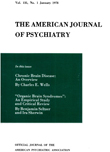Phenothiazine Intake and Staff Attitudes
Abstract
The authors report the percentages of patients who failed to adhere minimally to prescribed phenothiazine medication schedules in closed-ward, open-ward, and chronic outpatient treatment situations within a single hospital. An unexpected finding was that significantly more outpatients on thioridazine (55 percent) than on chlorpromazine (15 percent) were not taking minimal amounts of medication. Staff attitudes regarding the usefulness of antipsychotic medications were also studied. The principal factor governing patient intake of medication appeared to be the amount of direct patient supervision.
Access content
To read the fulltext, please use one of the options below to sign in or purchase access.- Personal login
- Institutional Login
- Sign in via OpenAthens
- Register for access
-
Please login/register if you wish to pair your device and check access availability.
Not a subscriber?
PsychiatryOnline subscription options offer access to the DSM-5 library, books, journals, CME, and patient resources. This all-in-one virtual library provides psychiatrists and mental health professionals with key resources for diagnosis, treatment, research, and professional development.
Need more help? PsychiatryOnline Customer Service may be reached by emailing [email protected] or by calling 800-368-5777 (in the U.S.) or 703-907-7322 (outside the U.S.).



